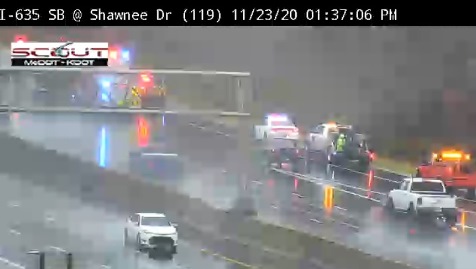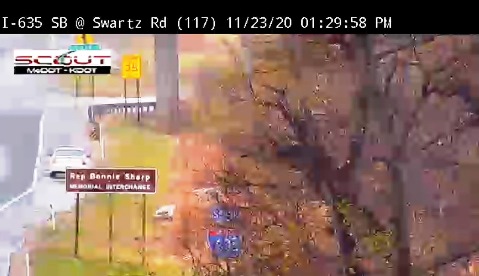by Stephan Bisaha, Kansas News Service
Wichita – Thousands of college students in Kansas will board planes and hop into cars daydreaming of sweet potatoes and turkey legs.
Most of those students won’t return to campus for the rest of the semester. To cut the risk of spreading the coronavirus, the majority of universities in Kansas will have students finish the fall semester online.
Even one-way Thanksgiving trips, health experts worry, could mean trouble when all those students return home, pack around holiday feasts, pass the gravy and hug an uncle or a grandma they haven’t seen for months.
One study found that student travel during spring break led to the local spread of the coronavirus. Now that the virus is surging across Kansas, the mass exodus from college campuses could make the spread even worse.
Here’s what Kansas six universities are — or aren’t — telling students before they leave to help prevent the spread.
Get tested before you go
Kansas State University has been encouraging all students to get tested before leaving — specifically three days before they travel to get results before they go.
“The thought of taking the virus back and infecting Mom and Dad or Grandma and Grandpa — we just want students to be thoughtful about that,” said Dr. Kyle Goerl, the director of K-State’s health center.
K-State can test about 1,000 students each day. That’s not enough to test every student before leaving. But that’s still more available than at most of the other state universities.
The American College Health Association, or AHCA, guidelines suggest colleges should encourage students to get tested to “know before you go.” The association acknowledges that’s not possible at all schools with limited resources.
Completely quarantining before leaving is out of the question with in-person classes still going on. But the university says students should cut back on the off-hour socializing. Even just a friend dropping by to share a cup of coffee risks spreading the disease and is the kind of behavior K-State says students should reconsider before traveling.
“Where we get into trouble is the social activities off campus,” Goerl said. “A lot of it is related to parities.”
Pittsburg State University was also offering tests to students before they left campus on Nov. 20.
Tests available if needed
The University of Kansas will offer testing to departing students — but only if they need one to travel.
If an asymptomatic student, faculty or staff member’s flight requires a negative COVID test, KU will give them a test at no cost. The same goes for those traveling to states that require a negative test result from incoming travelers.
Anyone with symptoms can still get tested regardless of their travel plans. KU is also still doing sample testing of symptom-free students to monitor the on-campus virus spread.
KU is the first Kansas university to say it will require students to get tested before they return in the spring. Students living on campus will be sent home for the winter with a saliva test kit so they can get their results before heading back to Lawrence.
No specific guidance
The other state universities say they might send some travel tips to students, but they aren’t pressing students to get tested before leaving.
Emporia State University has no testing or quarantine requirements or guidance for departing students.
Wichita State University recently opened up testing to any asymptomatic student that wants one — including offering a free meal pass for students that take the free test. But the school isn’t pushing for students to get tested before leaving campus.
WSU says that’s because testing isn’t a panacea. An exposed student can carry the virus for days without testing positive. Wichita State says that negative results could give students a false sense of security and lead them to ignore other preventative actions like masks and social distancing.
“Testing is important, but it’s not the answer to everything,” said Camille Childers, director for Student Health Services at Wichita State.
Back after turkey
Fort Hays State University is the one state school bringing students back on campus the week after Thanksgiving.
Most students living on campus at Fort Hays tend to be from nearby Kansas communities. While it has a sizable international student population, most of them are studying online from China. The university says most of its students have already been traveling between the campus and their homes during the semester.
“Those students are visiting their families on weekends anyway,” said Lynn Adams, the director of Student Health at Fort Hays. “It didn’t make any difference if they went and just stayed a few extra days.”
The ACHA says if students are going to return to campus after the break, then the college should at least encourage those students to stay on campus. Fort Hays is not suggesting students do that.
“It’s very difficult to make a broad statement that students shouldn’t do this or that,” Adams said, “because they each have their own little individual situation.”
What students should do
For traveling students, the ACHA has some suggestions for how to reduce the risk of spreading the coronavirus.
• Reduce the number of stops while traveling. That means sticking to direct flights or bringing food if driving to avoid restaurant pit stops.
• A flu shot before leaving would prevent influenza from spreading.
• Students should stick to the COVID-19 basics — wash hands frequently, maintain social distancing and wear a mask.
• If at all possible, hold that Thanksgiving feast outside.
• Above all else, if you are feeling ill, do not travel.
Stephan Bisaha reports on education and young adult life for the Kansas News Service. You can follow him on Twitter @SteveBisaha or email him at bisaha (at) kmuw (dot) org. The Kansas News Service is a collaboration of KCUR, Kansas Public Radio, KMUW and High Plains Public Radio focused on the health and well-being of Kansans, their communities and civic life.
Kansas News Service stories and photos may be republished by news media at no cost with proper attribution and a link to https://ksnewsservice.org/.
See more at https://www.kcur.org/news/2020-11-11/how-kansas-universities-are-sending-students-home-for-thanksgiving-in-a-pandemic.


